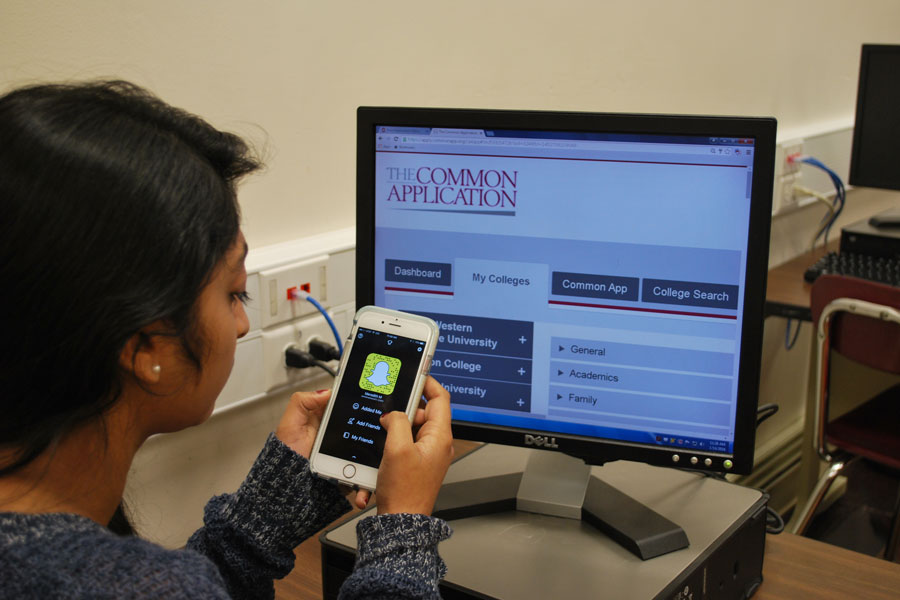Hidden consequences of drugs on social media
January 15, 2016
Social media has grown exponentially within the past decade, weaving itself throughout both personal and professional settings. With platforms such as Facebook and Twitter, one can share everything ranging from academic updates to photos of intoxicated partying.
However, while social media may provide entertainment and business opportunities, it is now being utilized by college admissions departments in order to eliminate undesirable prospective students.
Solon High School alumnus Kailey Edelman is a fourth year Communications major with a specialization in New Media and Technology at the Ohio State University. Along with her classmates, she analyzes online activity of applicants to the university and sends the results to the admissions office.
“It has really opened my eyes to how much influence social media has in today’s world,” she said. “Instead of having a resume that companies look at, you also now have to consider the possibilities of anyone coming across your profile on all social medias.”
She explained that Facebook, Twitter and Instagram are the main accounts that are looked at, although Snapchat is becoming more common.
“You definitely want to be careful with what you snap,” she said. “People can screenshot it, or download apps that allow [them] to save the picture without the user even knowing it. So just be aware that there is a way to save everything.”
According to a Courier survey of 753 Solon High School students, over 92 percent of students have an account on at least one form of social media. Although the majority of Facebook, Instagram and Snapchat users at SHS have their accounts set on “friends only,” just 36.5 percent of SHS Twitter accounts have privacy settings enabled.
Additionally, over 39 percent of drug users at SHS make posts on social media implying or showing the use of illegal substances; about 30 percent of underage drinkers at SHS also post on social media implying or showing alcohol consumption.
However, of all the students who have posted online about drug use, less than 81 percent actually use drugs, while 92 percent of students who post photos or texts regarding underage drinking actually do so. Even without actual consumption or use, the appearance of drugs and/or alcohol on social media accounts can be damaging during application processes.
“Many people think that just because their account is set to private, that they are safe,” Edelman explained. “But what many people, especially teens, don’t realize, is that there is always a way for someone to get a hold of anything you post.”
User agreement terms on most social media sites can grant access to a user’s posts to outside companies, such as colleges, through a series of intentional loopholes. When colleges see drug usage and underage drinking on an applicant’s social media accounts, they are likely to deny admission or even rescind acceptance. Edelman herself recalled a friend who lost admission into the University of Dayton, as well as a scholarship, due to Facebook images showing underage drinking.
“Especially with today’s generation, social media is something that is part of the daily routine,” Edelman said. “What was once a private life, is now a continuous update that documents every part of a person’s day. Companies and Universities know just how much we all use the different social medias, so they are now also looking at them to see what kind of person you are when you let your guard down. Unfortunately, it is easy for them to make a quick judgement on a person just by looking at a few posts, and if they don’t like what they see, then they will just move on and count you out.”
Over 92 percent of surveyed SHS students think that when their accounts are set to private, only those they allow can see what they post; about 19 percent also included that potential employers could see their posts, as well as 21 percent who believe that colleges can gain access to their posts while their accounts are private.
What these students don’t realize is that a simple Facebook search of someone’s account, even one set to “friends only” availability, can reveal the last five pictures in which that person was tagged. A lookup on Google can also display posts associated with one’s name, even those originally set as private.
Of SHS students surveyed, only 51 percent believe that if a college were to see an applicant’s social media post about illegal drugs, tobacco or underage drinking, it would be very important to the university’s decision regarding the applicant’s admission to their school.
Edelman suggested that in order to protect one’s self, all social media accounts should be set to private. For example, she uses her middle name rather than her last name on her Facebook account to make her account harder to locate. While safeguards like these may not fully protect a user from the adverse effects of posting online proof of drug and/or alcohol abuse, Edelman feels that they are worthy precautions.
“It does help if you clean up your past postings and set the account to private, because a lot of schools just look at what you have up currently,” Edelman explained. “But the chance that they could find a past picture of drinking or something else still remains. Just be smart and remember that nothing is private. What you post represents the kind of person you are. Just ask yourself, if you looked at your own social media [accounts], would you hire you?”
Note: Kailey Edelman is of no relation to news reporter Hannah Edelman.
